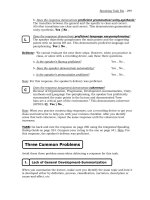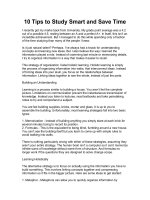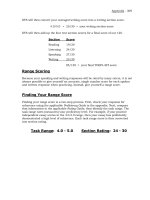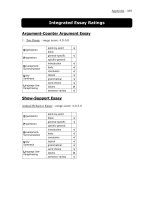ACT Assessment Study Skills and Test-Taking Strategies
Bạn đang xem bản rút gọn của tài liệu. Xem và tải ngay bản đầy đủ của tài liệu tại đây (537.13 KB, 18 trang )
Part 1: Study Skills
You probably feel as though you have spent practically your entire life studying, so why do you need to learn
how do study for the ACT? The ACT Assessment is different from any other test you have ever taken. Not only
is it longer and more important than any test you have had to study for, but multi-subject, standardized tests
require their own unique form of preparation.
You certainly do not have to scrap all the good study habits you have already learned, but you will most
likely have to adapt them to the specifics of the ACT Assessment. You may already be using some of the tech-
niques found in this chapter, but now is a good time to reevaluate your study habits and tailor them specif-
ically for the ACT.
In studying for the ACT, you will also learn which study habits do not work and be able to eliminate
wasted study time for good. Remember that the more effective your studying, the less time you will spend
studying and the more free time you will have to do what you really enjoy.
CHAPTER
ACT Assessment
Study Skills
and Test-Taking
Strategies
The advice in this chapter will help you set up an effective learning
environment and create a successful study plan. You will also learn
important study strategies and test-taking tips.
2
13
Study Environment and Attitude
T
HE
R
IGHT
M
OOD
It will probably be pretty tough to carve out extra time to study for the ACT on top of your regular school-
work, your extracurricular activities, and your social life. These are all reasons that may lead you to procras-
tinate. But procrastinating can cause lots of trouble at test time. If you procrastinate too much or for too long,
you will not be prepared for the exam.
One of the best ways to beat procrastination is to use a reward system. We all like to be rewarded for a
job well done. And if we know there is going to be a reward at the end of our work, it is easier to get started.
So promise yourself a small reward for each study session. For example, you might promise yourself an hour
of watching TV or playing video games as a reward for an hour of study. You might promise to treat your-
self to a movie or a new CD after you finish a chapter in a test-prep book. Get your parents involved with your
reward plan, and maybe they will provide some rewards of their own.
Remember, your attitude is very important. It can dramatically affect how much you learn and how well
you learn it. Make sure that you have a positive attitude. You will study, you will learn, and you will do well.
Your study time will be time well spent.
T
HE
R
IGHT
C
ONDITIONS
You can have the best attitude in the world, but if you are tired or distracted, you are going to have difficulty
studying. To be at your best, you need to be focused, alert, and calm. That means you need to study under
the right conditions.
Everyone is different, so you need to know what conditions work best for you. Here are some questions
to consider:
1. What time of day do you work best—morning, afternoon, or evening? How early in the day or late in
the night can you think clearly?
2. Do you work best in total silence? Or do you prefer music or other noise in the background?
3. If you prefer music, what kind? Classical music often helps people relax because the music is soft and
there are no words. But you may prefer music that energizes you. Others work best with music that has
special meaning to them and puts them in a positive state of mind.
4. Where do you like to work? Do you feel most comfortable sitting at the kitchen counter? At the dining
room table? At a desk in your bedroom? (Try to avoid studying in bed. You will probably be relaxed,
but you may be too comfortable and fall asleep.) Or do you prefer to study out of the house, in the
library or a local coffee shop?
5. What do you like to have around you when you work? Do you feel most comfortable in your favorite
chair? Do you like to have pictures of family and friends around?
6. What kind of lighting do you prefer? Does soft light make you sleepy? Do you need bright light? If it’s
too bright, you may feel uncomfortable. If it is too dark, you may feel sleepy. Remember that poor
lighting can also strain your eyes and give you a headache.
–
ACT ASSESSMENT STUDY SKILLS AND TEST-TAKING STRATEGIES
–
14
7. How does eating affect you? Do you feel most energized right after a meal? Or does eating tend to
make you feel sleepy? Which foods give you a lot of energy? Which slow you down?
8. Can you put problems or other pressing concerns out of your mind to focus on a different task? How
can you minimize distractions so you can fully focus on your work?
Think carefully about each of these questions and be honest with yourself. You may like listening to
music, but do you really study better in silence? Do you usually study in your room, but are tempted by talk-
ing on the phone or using the computer? The more honestly you evaluate your study environment, the more
effectively you will use your time, and the less time you will have to spend studying. Write down your answers
so you can develop a good study plan.
S
TUDY
G
ROUPS
The majority of your study time should be spent alone in the environment that is best for your study style.
However, a good way to get motivated and add some variety to your studying is by forming or joining a study
group. Not only will studying with a group be more fun than studying alone, but if you are stuck on a prob-
lem, there will probably be someone in your group who can explain it to you. And do not underestimate the
value of helping other people in your group. Explaining a difficult concept to someone else is a great way to
reinforce what you know or help you figure out what you do not really understand. There are a few things to
keep in mind when you form your study group:
■
find an appropriate place to study, somewhere where there are few distractions
■
keep your group small; three or four people is best
■
include only other students who are as serious about studying for the ACT as you are
■
set an agenda for your meeting, keep it specific, and decide on one concrete goal for your meeting
T
HE
R
IGHT
T
OOLS
Help make your study session successful by having the right learning tools. As you study for the ACT, have:
■
a good dictionary, such as Webster’s 10th Edition
■
a calculator
■
paper or legal pads
■
pencils (and a pencil sharpener) or pens
■
a highlighter, or several in different colors
■
index or other note cards
■
folders or notebooks
■
a calendar
–
ACT ASSESSMENT STUDY SKILLS AND TEST-TAKING STRATEGIES
–
15
Keep your personal preferences in mind. Perhaps you like to write with a certain kind of pen or on a
certain kind of paper. If so, make sure you have that pen or paper with you when you study. It will help you
feel more comfortable and relaxed as you work.
Learning How You Learn
Imagine that you need directions to a restaurant you have never been to before. Which of the following would
you do?
■
Ask someone to tell you how to get there.
■
Look on a map.
■
List step-by-step directions.
■
Draw a map or copy someone’s written directions.
Most people learn in a variety of ways. They learn by seeing, hearing, doing, and organizing informa-
tion from the world around them. But most of us tend to use one of these ways more than the others. That’s
our dominant (strongest) learning style. How you would handle getting directions, for example, suggests
which learning style you use most often:
■
Visual. Visual learners learn best by seeing. If you would look at a map for directions, you are probably
a visual learner. You understand ideas best when they are in pictures or graphs. You may learn better by
using different colors as you take notes. Use a highlighter (or several, in different colors) as you read, to
mark important ideas. Mapping and diagramming ideas are good learning strategies for visual learners.
■
Auditory. Auditory learners learn best by listening. If you would ask someone to tell you directions, you
are probably an auditory learner. You would probably rather listen to a lecture than read a textbook,
and you may learn better by reading aloud. Try recording your notes on a tape player and listening to
your tapes.
■
Kinesthetic. Kinesthetic learners learn best by doing. (Kinesthetic means feeling the movements of the
body). They like to keep their hands and bodies moving. If you would draw a map or copy down direc-
tions, you are probably a kinesthetic learner. You will benefit from interacting with the material you are
studying. Underline, take notes, and create note cards. Recopying material will help you remember it.
■
Sequential. Sequential learners learn best by putting things in order. If you would create a step-by-step
list of driving directions, you are probably a sequential learner. You may learn better by creating out-
lines and grouping ideas together into categories.
Think carefully about how you learn. Which is your dominant learning style? Keep it in mind as you
read about Learning Strategies in Part 2 of this chapter.
–
ACT ASSESSMENT STUDY SKILLS AND TEST-TAKING STRATEGIES
–
16
Learning Styles and Finding the Methods Right For You
The best way to tackle the preparations involved in studying for the ACT is to first think about the way you
study now. Do you set aside a specific time to do your homework? Is there a place that you always go to study?
Do you take on all your subjects at once or start with the easiest? Once you have given some thought to your
current study habits, it is time to honestly evaluate how well they actually work.
Creating a Study Plan
You will probably spend more time studying for the ACT than you have spent studying for any other test. So
even with the best intentions, if you sit down with this book and say “I’m going to master the ACT,” you will
most likely get discouraged and give up before you sharpen your number 2 pencil. But, if instead you create
a study plan by breaking down your tasks into manageable parts and scheduling time to tackle them, you will
almost certainly succeed.
The first step you should take is to make a list of everything you need to study in order to do well on
the ACT. Make this list as detailed as possible. Instead of “study English” or “practice math,” for example,
appropriate tasks should be “take a practice English test” or “go over missed questions on the last math prac-
tice test.” Make your list long. The smaller the tasks, the faster you will be able to cross them off your list. The
effort you put in at the start will more than pay off in the end by eliminating wasted time.
W
HAT
Y
OU
K
NOW AND
W
HAT
Y
OU
N
EED TO
K
NOW
In order to make your list, you need to find out what you already know and what you need to learn. To cre-
ate an effective study plan, you need to have a good sense of exactly what you need to study. Chances are you
already know some of the test material well. Some of it you may only need to review. And some of it you may
need to study in detail.
Each chapter of this book includes a skills assessment, which you can use to create your list. You should
also take a practice ACT Assessment to find out how you would do on the exam. How did you score? What
do you seem to know well? What do you need to review? What do you need to study in detail?
S
CHEDULING
S
TUDY
T
IME
You next need to set a time frame. Once you have a good sense of how much studying is ahead, create a
detailed study schedule. Use a calendar to set specific deadlines. If deadlines make you nervous, give yourself
plenty of time for each task. Otherwise, you might have trouble keeping calm and staying on track.
To create a good schedule, break your studying into small tasks that will get you to your learning goals.
A study plan that says “Learn everything by May 1” isn’t going to be helpful. However, a study plan that sets
dates for learning specific material in March and April will enable you to learn everything by May 1. For exam-
ple, if you need to focus on building your reading comprehension skills, you might create a schedule like the
following:
–
ACT ASSESSMENT STUDY SKILLS AND TEST-TAKING STRATEGIES
–
17
Week 1 Review basic reading comprehension strategies.
Week 2 Practice finding the main idea.
Week 3 Practice vocabulary in context questions.
Week 4 Practice specific detail questions.
Week 5 Practice inference questions.
Week 6 Practice finding the references.
Week 7 Take reading practice test.
Week 8 Begin reviewing grammar/usage rules.
Week 9 Continue reviewing grammar/usage rules.
Week 10 Start overall review.
Week 11 Continue overall review.
Every day: Read the editorials in the local newspaper.
As you set your deadlines, think carefully about your day-to-day schedule. How much time can you
spend on studying each week? Exactly when can you fit in the time to study? Be sure to be realistic about how
much time you have and how much you can accomplish. Give yourself the study time you need to succeed.
S
TICK TO
Y
OUR
P
LAN
Make sure you have your plan written on paper and post your plan where you can see it. (Do not just keep
it in your head!) Look at it regularly so you can remember what and when to study. Checking your plan reg-
ularly can also help you see how much progress you have made along the way.
It is very important that you do not give up or get discouraged if you fall behind. Unexpected events
may interrupt your plans. You may have a big test coming up at school or you may even come down with the
flu. Or it might just take you longer to get through a task than you planned. That’s okay. Stick to your sched-
ule as much as possible, but remember that sometimes,“life gets in the way.”So if you miss one of your dead-
lines, do not despair. Instead, just pick up where you left off. Try to squeeze in a little extra time in the next
few weeks to catch up. If that does not seem possible, simply adjust your schedule. Change your deadlines so
that they are more realistic. Just be sure you still have enough time to finish everything before the exam.
You will need to revisit your list often, allotting more time to areas you feel less comfortable with and
reducing the time needed on areas you have mastered.
How Do You Know What You Know?
One of the keys to successful studying is knowing what you know, and knowing what you don’t know. Prac-
tice tests are one good way to measure this. But there are other ways.
One of the best ways to measure how well you know something is how well you can explain it to some-
one else. If you really know the material, you should be able to help someone else understand it. Use your
learning style to explain a difficult question to someone in your study group. For example, if you are an audi-
tory learner, talk it out. If you are a visual learner, create diagrams and tables to demonstrate your knowledge.
–
ACT ASSESSMENT STUDY SKILLS AND TEST-TAKING STRATEGIES
–
18
Rewrite your notes or make up your own quizzes with questions and answers like those on the exam. Pro-
vide an explanation along with the correct answer.
How do you know what you do not know? If you feel uncertain or uncomfortable during a practice test
or when you try to explain it to someone else, you probably need to study more. Write down all of your ques-
tions and uncertainties. If you write down what you do not know, you can focus on searching for answers.
When you get the answers, you can write them out next to the question and review them periodically. And
notice how many questions you answer along the way—you will be able to see yourself making steady
progress.
If you are avoiding certain topics, it is a good sign that you don’t know those topics well enough for the
exam. Make up your mind to tackle these areas at your next study session. Do not procrastinate!
Part 2: Learning Strategies
How successful you are at studying usually has less to do with how much you know and how much you study
than with how you study. That is because some study techniques are much more effective than others. You
can spend hours and hours doing practice tests, but if you do not carefully review your answers, much of your
time will be wasted. You need to learn from your mistakes and study what you do not know. The best method
is to use several of the following proven study techniques. You may already be taking advantage of many of
these study skills in your normal schoolwork, but they can help you make the most of your learning style and
store information in your long-term memory.
Asking Questions
Asking questions is a powerful study strategy because it forces you to get actively involved in the material you
want to learn. That, in turn, will help you better understand and remember the material. And there is another
important benefit—asking and answering your own questions will help you be comfortable with the format
of the exam.
For example, when you are reading something you can ask yourself questions like those you would see
on the ACT, such as:
1. What is this passage about?
2. What is the main idea?
3. What is the author’s purpose and point of view?
4. What is the mood or tone?
5. What is the meaning of this word as it is used in the sentence?
6. Is this sentence a main idea or a detail?
–
ACT ASSESSMENT STUDY SKILLS AND TEST-TAKING STRATEGIES
–
19









